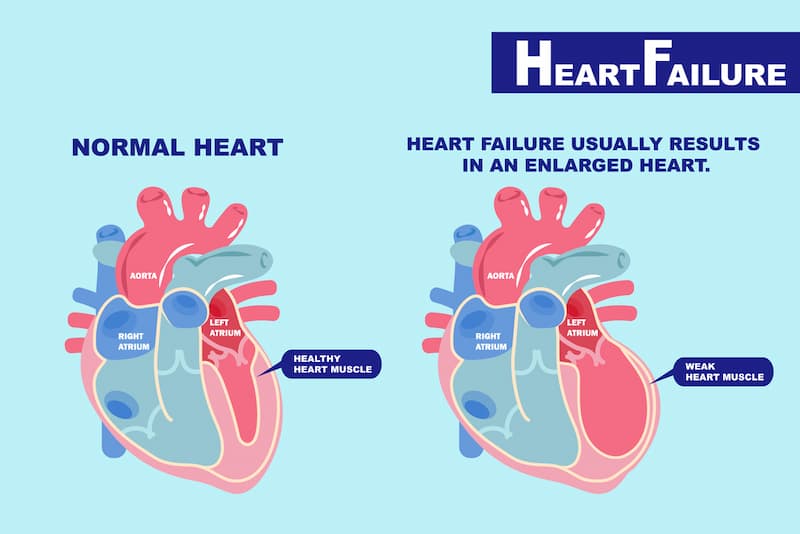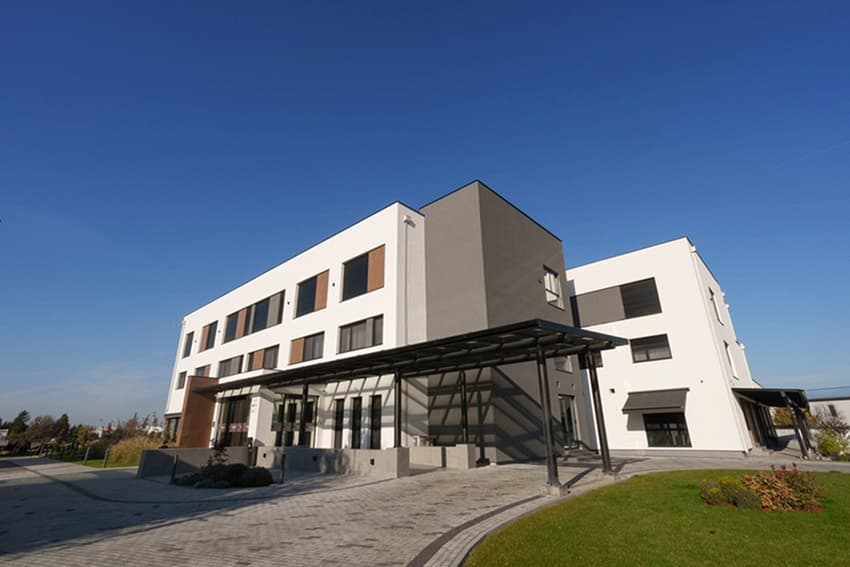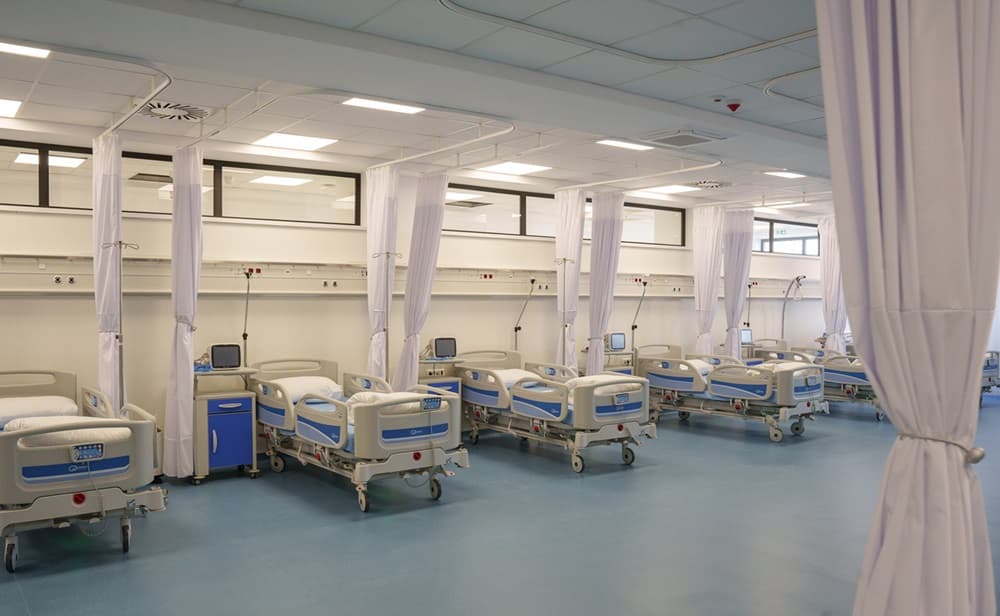Heart failure is an acute or chronic condition that affects millions of people worldwide. The most commonly accepted methods of treatment usually include symptom management and medication taken for life, so the burden caused by the condition is heavy. Stem cell therapy for heart failure has emerged as a new way to treat and manage the core of the disease. It does this by regenerating the damaged heart tissue and restoring it to optimal condition.
This article briefly discusses the science, benefits, and real-life applications of stem cell therapy for congestive heart failure, guiding patients to choose appropriate and newer methods of treatment.
What Is Stem Cell Therapy for Heart Failure?
Stem cells are known for their regeneration and self-renewal properties, and congestive heart failure stem cell treatment revolves around this property, using them to repair damaged heart tissue. This addresses the primary issue with heart conditions, namely cardiac muscle damage caused by ischemic injury or other conditions.
Heart failure occurs when the blood pumped through the contraction of the heart muscles is inadequate to supply oxygen and resources to the whole body. This leads to symptoms such as shortness of breath, tiredness, and body swelling. It is possible to partially restore heart function and manage symptoms by harnessing the regenerative power of stem cells for heart failure.

How Does Stem Cell Therapy Help in Heart Failure?
This therapy utilizes the capacity of stem cells to self-regenerate and self-heal. Following the admission of stem cell injections for congestive heart failure, several mechanisms come into play:
- Cellular regeneration: Stem cells for heart failure promote the formation of specialized cardiac muscle cells and regenerate damaged tissue, improving the heart’s pumping capacity.
- Improved blood flow: Another important function of stem cell treatment in heart failure patients is the production of newer blood vessels (angiogenesis), which were harmed, leading to impaired oxygen and nutrient delivery to the heart tissues. Solving this problem leads to better cardiac activity.
- Reduced inflammation: Inflammation is one of the causes of cardiac dysfunction; stem cells have immunomodulatory properties that reduce inflammation.
- Paracrine signaling: Stem cells help in the release of paracrine factors, which are growth factors and cytokines that promote healing and repair processes.
Benefits of Stem Cell Therapy for Heart Failure Patients
Stem cell therapy provides several significant benefits for patients’ overall quality of life.
Improvements in Heart Function, Quality of Life, and Long-Term Survival
Heart failure stem cell’ clinical trials have shown that they improve both quality of life and long-term survival.
| Benefit | Description |
| Improved tissue perfusion | By increasing ventricular ejection fraction, leading to a better pumping ability. |
| Symptomatic improvement | Reduces heart failure symptoms like fatigue, shortness of breath, and body swelling. |
| Increases life expectancy | Stem cell therapy has been shown to increase the long-term survival of heart failure patients. |
Potential for Reduced Dependence on Medication and Fewer Hospital Visits
| Benefit | Description |
| Reduces polypharmacy | Stem cell treatment for congestive heart failure reduces the dependence on the fact of chronic medical use by improving cardiac conditions. |
| Fewer hospital visits | Stem cell therapy has been shown to decrease hospital visits and the psychological burden of feeling helpless after being in the hospital repeatedly. |
Types of Stem Cells Used in Heart Failure Treatments
There are multiple types of stem cell therapy for heart failure that have gained acceptance following a great deal of research.
- Mesenchymal stem cells (MSCs): These are types of adult stem cells that are acquired from bone marrow, fat tissue, and skin cells. They have cell regenerative and anti-inflammatory properties. These are the most common and well-researched types of stem cells. At Swiss Medica, we use mesenchymal stem cells for heart failure treatment.
- Embryonic stem cells (ESCs): These are acquired from embryos and have the pluripotent potential to transform into any type of cells, including cardiac ones. The main problem with these cells is that, as they are taken from embryos, they have many ethical and legal restrictions and are only used in specific scenarios. At Swiss Medica, we do not use these types of cells for the reasons mentioned above. Most of the side effects of stem cell therapy, such as tumor development, are seen with embryonic stem cells.
- Cardiac stem cells (CSCs): These cells originate in the heart and are well-suited to cardiac repair.
Get a free online consultation
Please, contact our medical advisor to discuss your health condition with a specialist in regenerative medicine. You can also leave your contact details for a callback. It is free and confidential.

Medical Advisor, Swiss Medica doctor
The Process: What to Expect During Stem Cell Therapy
The application and treatment of stem cell therapy consists of five steps:
- Eligibility evaluation. Patients begin with an online consultation with our medical advisor and are then evaluated by a cardiologist, who will obtain the necessary medical history, perform blood tests, and request imaging studies to determine whether stem cell treatment for heart failure is a viable option. After a few days, doctors will determine if patients are eligible for stem cells for heart failure.
- Treatment plan development. Based on the medical evaluation, we will design a personalized treatment plan that may include stem cell therapy, additional therapies with exosomes or other bioproducts, and supportive care.
- Stem cell preparation. Before treatment, we harvest multipotent mesenchymal stem cells from various sources in our own laboratory. The stem cells collected from donors are then cultured and activated in our lab, ensuring that the stem cell products are ready when you arrive at the clinic. Exosomes and secretome are produced by cells during cultivation and can be combined with the main therapy to improve results.
- Cell’s administration. We administer stem cells through painless stem cell injections for congestive heart failure. A highly trained physician will inject processed stem cells into the bloodstream; the entire procedure takes less than an hour.
- Follow-up care. After finishing the congestive heart failure stem cell treatment procedures, our patients will be monitored for any complications and outcomes. Patients will have follow-up visits that are scheduled to track the progress of heart function and overall health.
Is Stem Cell Therapy for You?
Not all patients with heart failure are eligible for stem cell therapy. There are different criteria that need to be fulfilled before a patient can be accepted by stem cell clinics that treat congestive heart failure. These are:
| Criteria | Description |
| Severity of heart failure | Stem cell therapy for heart failure is more beneficial in patients who are symptomatic with moderate to severe heart failure and who have not responded to the previously accepted conventional treatment methods. |
| General health | Patients should have no contraindications to the procedure. |
Patients should consult specialists at stem cell treatment clinics for congestive heart failure to determine their suitability.
Recovery Time and Expected Outcomes
The recovery time and expected outcomes after stem cell treatment for heart failure are variable and depend on the individual patients and their condition before the treatment.
Timeline for Recovery and Improvement in Heart Function Post-treatment
Recovery and improvement after stem cell transplant for heart failure varies by patient. It depends on multiple factors, including the patient’s condition, the specific type of treatment, and the success of treatment. At Swiss Medica, after the procedure, patients usually experience mild irritation and swelling at the injection site, but most of them will resume their normal activities within a few days.
Heart conditions take time to improve. Few changes will be seen in the first few weeks. At Swiss Medica, patients generally see clinically noticeable changes after 3–6 months. Congestive heart failure stem cell treatment patients experience a significant improvement in symptoms like shortness of breath and fatigue.
Realistic Expectations and Long-Term Benefits Based on Clinical Studies
Many studies and clinical trials are still being done on stem cell therapy for heart failure, and research has shown that the improvement of cardiac function may vary. Some patients experience a significant improvement in their quality of life and heart performance, while others see modest results that are still better than conventional treatment.
Long-term studies are needed to better understand the durability of these effects, but early findings of heart failure stem cell research suggest that this therapy could provide a long-lasting benefit in terms of improved heart functions and reduced hospitalizations.
Comparing Stem Cell Therapy with Traditional Treatments for Heart Failure
| Traditional treatments for heart failure | Stem cell treatment for congestive heart failure | |
| Approach | Manages symptoms, improves quality of life, and increases life expectancy | Encourages partial regeneration of heart tissue and contributes to restoring heart functions |
| Methods | Medications, lifestyle modifications, and surgical interventions | Transplanting stem cells to damaged cardiac tissue |
| Invasiveness | May involve invasive procedures | Less invasive |
| Long-term medication | Often requires long-term medication use | Potentially reduces the need for long-term medication |
Pros and Cons of Opting for Stem Cell Therapy as an Alternative or Complement to Other Methods
Pros:
- Helps in tissue regeneration and improves heart function.
- Reduces long-term reliance on medications and hospital visits.
- Minimally invasive procedure.
- Stem cell therapy, when combined with traditional treatment methods, contributes to longer-term results.
Cons:
- It may not be available worldwide and is costly.
- Some stem cell therapies, such as embryonic stem cells, can have a negative impact on patients’ health. That is why it is critical to only use adult stem cells obtained after a healthy child’s birth.
Risks and Potential Side Effects of Stem Cell Therapy for Heart Failure
All treatment methods present with their own side effects, and this is true for stem cell therapy too. Commonly, patients may experience some mild irritation and swelling at the injection site; it is temporary, and it will disappear in a couple of days.
Furthermore, after stem cell injections for congestive heart failure, it is possible for individuals to experience a general sense of fatigue, a reduced appetite, or disinterest in food. They may also have a feeling of nausea and episodes of vomiting, as well as skin-related problems like irritation, redness, and itchiness. These are all typically temporary side effects as the body tries to adjust to stem cell treatment for heart failure.
Cost of Stem Cell Therapy for Heart Failure: What to Expect
The cost of stem cell therapy for heart failure varies greatly and depends on the type of stem cells used, the condition, and the location of treatment. In general, patients expect to pay between $10,000 and $50,000 for treatment worldwide.
At Swiss Medica, the final cost of therapy is determined by the physician, and it ranges from €7,000 to €31,000* (these prices are valid as of January 2025). The full cost of treatment usually falls on the patient, as insurance companies still do not include it in their coverage. Before proceeding, patients should consult with their insurance provider and stem cell treatment clinics for congestive heart failure to determine the financial aspects.
*The prices mentioned are indicative and subject to change based on individual factors, including the condition’s severity and the number of stem cells needed. Prices are valid as of January 2025.
Can Stem Cells Cure Congestive Heart Failure Permanently?
Stem cell therapy for heart failure shows great promise; multiple studies are being held, and many patients testify that they have seen significant improvement. However, it is still not considered a stand-alone form of treatment. Can stem cells cure congestive heart failure? The answer is still being investigated. However, heart failure stem cell research continues to enhance the effectiveness of this treatment.
Choosing the Right Clinic for Stem Cell Heart Treatment
Patients are advised to choose certified clinics with a strong track record in stem cell treatment for congestive heart failure. To ensure safety and effectiveness of treatment, patients need to make sure that the clinic has:
- The proper verifications and credentials,
- Testimonials from patients who have had the treatment,
- Clear data on the success rate,
- Compliance with regulatory standards.
Swiss Medica has been in operation since 2011, helping over 10,000 patients improve their conditions and establishing itself as a leading medical center specializing in advanced regenerative and stem cell therapies. We have now opened a state-of-the-art hospital in Belgrade with all necessary equipment for procedures as well as a comfortable stay after the procedure:
- Large and comfortable area: 10,000 square meters spread across five buildings.
- 24/7 medical support: Our clinic is fully equipped with cutting-edge medical technology, and our team of 250 professionals is available around the clock to provide continuous care and support. Reputable stem cell clinics in the United States that treat the heart use the same advanced techniques that we do at Swiss Medica in Serbia.
- Own laboratory: Compliant with A-grade standards, equipped for cutting-edge medical research, stem cell production, and storage.
- Innovative cell and biomedical products: We offer approximately 31 types of cell products and active biomedical products developed in our laboratory.
- Excellent location: Only 15 minutes from the airport.
The majority of patients appreciated Swiss Medica’s commitment to providing a pleasant and welcoming environment during their stay. They also emphasize the importance of maintaining contact with their medical advisors once their primary treatment is complete.
Our new hospital in Belgrade provides a modern, comfortable setting designed to create a calm and welcoming environment for recovery.
Our patients regularly share their experiences at Swiss Medica. See how our stem cell treatment helped one patient recover from a heart attack.
Frequently Asked Questions About Stem Cell Therapy for Heart Failure
1. What progress has been made in stem cell therapy for heart failure?
Advancements include improved delivery methods, a better understanding of stem cell function, and successful heart failure stem cell clinical trials.
2. How long do the benefits of stem cell therapy last?
The benefits of stem cell therapy vary. Some studies have shown long-term improvements, but more research is needed to determine the exact timeframe.
3. How much does stem cell therapy for heart failure cost?
The cost varies based on the type of treatment and geographic location of the stem cell clinic that treats congestive heart failure.
4. What is the success rate of stem cell therapy for heart failure?
The success rate of stem cell transplants for heart failure is increasing day by day, but the exact figure still needs to be determined. More research is needed to assess its effectiveness. At Swiss Medica, we provided stem cell therapy to over 10,000 patients with a variety of conditions, with a success rate approaching 80%.
Simply provide your details in the form below, and our medical advisor will get in touch with you to arrange a no-cost online consultation to address all of your concerns.
Contact us
Get a free online consultation to learn about the expected results of stem cell therapy for your case, what is the cost of the treatment, and its duration.

Medical Advisor, Swiss Medica doctor
List of References:
WebMD. (2023). Stem cells for heart failure treatment. WebMD. Retrieved from https://www.webmd.com/heart-disease/heart-failure/stem-cells-heart-failure-treatment
Author, A. A. (Year). Title of the article. National Institutes of Health (.gov). Retrieved from https://pmc.ncbi.nlm.nih.gov/articles/PMC10803627/
American Heart Association. (2023). Stem cell therapy for heart failure reduced major CV events and death, not hospitalization. American Heart Association. Retrieved from https://newsroom.heart.org/news/stem-cell-therapy-for-heart-failure-reduced-major-cv-events-and-death-not-hospitalization
Langan, J. B., Zhang, Y., Sundaresan, M., Rosanio, S., Wehmann, K., Xu, Q., … & Vatner, S. F. (2016). Mesenchymal stem cells reduce LV dysfunction and remodeling after myocardial infarction in mice. Cardiovascular Research, 109(1), 111-122. https://doi.org/10.1093/cvr/cvw003
University Hospitals Birmingham NHS Foundation Trust. (2023). Innovative stem cell therapy offers heart attack patient a new lease of life. University Hospitals Birmingham NHS Foundation Trust. Retrieved from Leung, T., Chen, C. J., Kahn, M. L., & Tzima, E. (2014). Cholesterol regulates vascular signaling and atherosclerosis through P2Y12-dependent TGF-β signaling. Circulation Research, 114(2), 315-324. https://doi.org/10.1161/circresaha.113.300219
Journal of Translational Medicine. (2024). Chemically synthesized osteocalcin alleviates NAFLD via the AMPK-FOXO1/BCL6-CD36 pathway. Retrieved from https://translational-medicine.biomedcentral.com/articles/10.1186/s12967-024-05352-y
Borow, K. M., Yaroshinsky, A., Greenberg, B., & Perin, E. C. (2019). Phase 3 DREAM-HF Trial of Mesenchymal Precursor Cells in Chronic Heart Failure. Circulation research, 125(3), 265–281. https://doi.org/10.1161/CIRCRESAHA.119.314951
MD, Pediatrician, Regenerative Medicine Specialist











